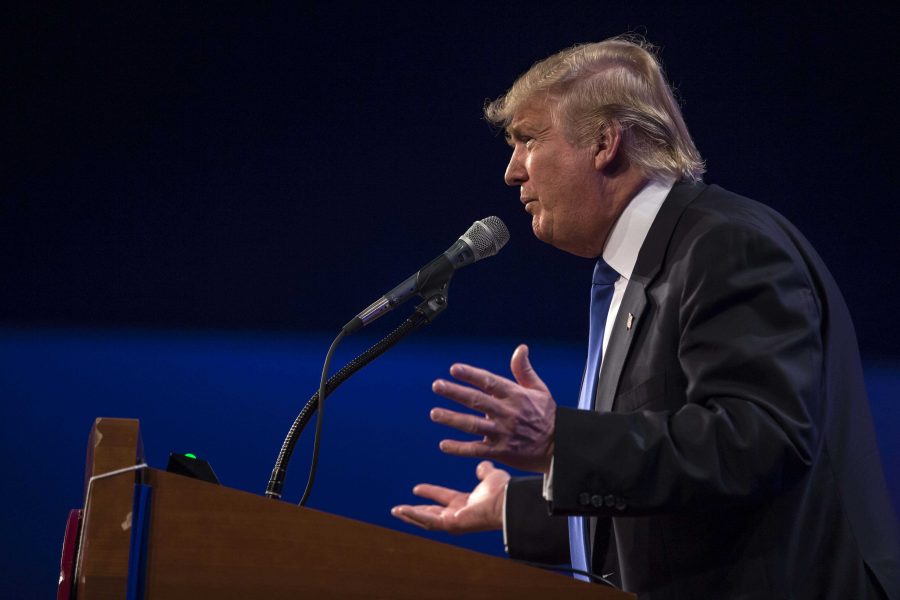By Madeleine Neal
[email protected]
When Steve Bannon left the White House in August, he had a message for President Trump’s voters: They would not get the presidency Trump campaigned on.
Former chief strategist Bannon said it would be different from Trump’s far-right campaign rhetoric.
Tim Hagle, a University of Iowa associate professor of political science, said that while the president’s distance from his previous far-right stances might have upset Bannon, ideological changes are not unusual in politics.
“That’s not unlike what you see in other situations — when someone [Bannon] who has a political viewpoint on the right or left, and they want to hold members of their party accountable when they’re not getting it done,” Hagle said. “When you’re sitting behind the desk of the president [in] the Oval Office, you’re in a different perspective — you’re getting different information.”
Trump’s inability to fulfill more of his campaign promises, Hagle suggested, does not come from Trump’s ideology, but from campaigning as what he called the outside candidate. This, Hagle said, could lead to difficulties pushing legislation through Congress.
“Trump was supposed to be the dealmaker,” Hagle said. “We’ve seen a number of Republicans in Congress saying Trump’s gone too far, or ‘He shouldn’t have said this or that.’ ”
RELATED: TRUMP RALLIES THE FAITHFUL IN CEDAR RAPIDS
But while Hagle acknowledged a growing distance between the president and those who voted for him, and between the president and Republican members of Congress, he said the separation is nothing new.
“[It] happened to Clinton, to George W. Bush …” he said. “[It’s] a little more pronounced with Trump but it’s nothing new — people just want to get stuff done.”
Cindy Golding, a former chairwoman of the Linn County Republican Party and a local business owner, said she credits improvement in the business climate and the morale of small business owners to the president’s policy decisions so far.
Trump’s far-right rhetoric, however, was not what sparked Golding’s interest; rather, Trump’s ability to negotiate, such as the recent NAFTA renegotiations.
RELATED: STICKY ROAD FOR NAFTA REDO
Golding said she disagrees with Bannon, contending that Trump is still carrying out the presidency he campaigned on.
“I think that’s [Bannon’s statement] a bunch of baloney — I think that’s a lot of noise trying to to distract from the mission of improving our county. There’s been a lot of noise surrounding this presidency over things that are really inconsequential to the goal,” she said. “Whether Steve Bannon is there or not, he’s not whom we elected. Being an employer, you hire people you think are cut out for the job, and sometimes you have to change.”
Matt Evans, the chairman of the Johnson County Republican Party, said Trump is just starting to fulfill his campaign promises.
Despite the possibility of compromising on some of his leading campaign promises, such as building a wall on the border between Mexico and the United States, Evans said, he still believes Trump will pull through.
“There’s still a lot of time. I think he intends to keep his campaign promises. It looks bad if you don’t. It’s still early, and he still has plenty of time,” he said. “I’m happy that he’s working to scale back regulations and things of that sort. I don’t agree with everything he does, but I am happy to see the general move in economy [toward something more pro-business].”
Evans said he, too, thinks people are happy to see the economy moving in a more pro-business direction.
Another aspect of Trump’s campaign was his promise to change the status quo and remove Washington insiders.
“There was a large antiestablishment wave,” he said, referring to Trump’s populist rhetoric.
Kyle Apple, a vice chair of the UI College Republicans, said that although he doesn’t necessarily agree with the “again” in Trump’s slogan “Make America Great Again,” he was drawn to the campaign and how it resonated with Americans.
“A lot of people see a disconnect between the government and the people,” he said.
When it comes to Trump’s inability to fulfill certain campaign promises, Apple said, some of the fault should fall back on Congress.
“I voted for him, so I will continue to support him,” he said. “Trump has an incredibly loyal voter base.”
Patrick Wronkiewicz, the president of the UI College Republicans, conceded that Trump might have been ill-prepared for his presidency, which, he said, started with his trusting Congress.
“I think Trump is still supported. A lot of people believe in his message — the media [falsely] convey approval ratings among Republicans,” he said. “When things are trying to go through Congress but they won’t pass, a lot of people blame the president. I’m disappointed in the [congressional] Republicans.”
Caroline Tolbert, a UI professor of political science, said she has observed an increasing number of people having emotional responses to political candidates and leaders.
“One of the things, I think, why you are not seeing a deterioration in his base of support as much as you might see with a typical candidate, is because his supporters, or some segment of them, became emotionally invested in his candidacy and presidency,” she said.
Many Trump supporters cite Trump’s personality more than his policies, according to a Pew Research Center study in August.
“He’s a personality president,” Tolbert said, referring to the study. “When people have an emotional attachment to something, even when evidence shows it’s not working, it can take a while to relearn or readjust their opinions.”
Nate Silver’s Five Thirty Eight report put Trump’s approval rating at 38 percent.
“It’s stayed. It’s just stayed the same since April,” she said referring to Silver’s report. “What’s interesting is that even with all of the [negative] news, his support doesn’t seem to change from this roughly 30 percent.”
Kit Fitzgerald and Molly Hunter contributed to this story.



